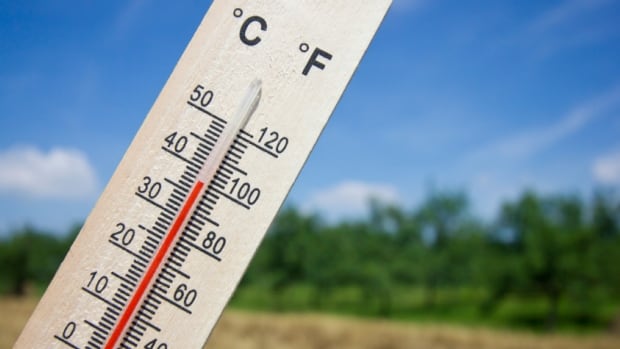High temperatures prompt B.C. health authorities to warn of heat-related illness
Left untreated, heat stroke can quickly become a medical emergency

Environment Canada is warning residents in several BC communities to brace for record breaking high temperatures in the coming days — and that has prompted warnings from two of B.C.'s health authorities.
"When the temperature goes up we see people experiencing symptoms, seeing their doctors, going to the emergency room," said Dr. Andrew Larder, a medical health officer with the Fraser Health Authority.
"There have been studies that show mortality rises as the temperature rises," he added.
- Wildfire smoke and heat headed for Metro Vancouver
- Massive ridge of high pressure to bring hot, hot weather to B.C.'s South Coast
Affected areas include Vancouver, the Fraser Valley, Victoria, East Vancouver Island, Gulf Islands, Sunshine Coast and Whistler.
Your body heats up faster than it can cool down
Heat stroke is the result of your body gaining heat faster than it can cool itself down.
When your body temperature rises, heat is released through increased sweating and blood flow to the skin. This allows your body to cool and return to its normal temperature.
Heat-related illness occurs when your body is unable to properly cool itself in hot outdoor or indoor environments or during intense physical activity.
"Its very easy to start being affected by the heat," said Larder. "Vigilance is always important. Don't exercise in the hot sun. Keep well hydrated and seek shade when you don't need to be in the sun," he said.
Other ways to avoid heat-related illness include wearing light coloured, loose fitting clothing and refraining from strenuous exercise between 11:00 a.m. and 3:00 p.m.
Everyone is at risk
Dr. Meena Dawar with Vancouver Coastal Health cautions it's not just children, the elderly and the homeless that are vulnerable during heat waves.
"Everyone is at risk of heat related illness," said Dawar. "We're just not acclimatized to the type of temperatures that we'll see this week."�

The soaring temperatures also mean people who work outside have to be extra vigilant — and so do their employers.
Last year in B.C., there were 16 claims for work-related injuries caused by heat exhaustion and heat stroke.
"Workers performing outdoor jobs across many industries face the risks associated with hot weather," said Patrick Davie with WorkSafeBC. "Employers are required by law to know if their workers are at risk by performing a heat-stress assessment and implementing a mitigation plan when necessary."
The occupations with the highest number of claims included: truck and bus drivers, lifeguards, recreation sport, fitness leaders and motion-picture production assistants.
Warning signs
Symptoms of heat-related illness can range from mild to severe. They include:
- Pale, cool, moist skin
- Heavy sweating
- Muscle cramps
- Rash
- Swelling, especially hands and feet
- Dizziness and/or fainting
- Nausea and/or vomiting
- Fever, particularly a core body temperature of 40° C or more
- Confusion and decreased mental alertness
- Seizures
- Unconsciousness/coma
The B.C. Coroners Officer said extreme heat likely played a role in the death of Vivek Pandher, a 22-year-old UBC engineering student last summer.
Pandher was found unresponsive at the Paradiso music festival near Wenatchee, Wash. in June.
He was transferred back to Vancouver General Hospital, where he died several days later.
Temperatures at the music festival were reported to be as high as 40 C. His death is still being investigated.
Temperatures are expected to peak Thursday, but records are expected to be broken through August as well.
If you or someone you know experiences heat stroke with symptoms lasting longer than one hour or that worsen, you are urged to contact a health-care provider immediately.